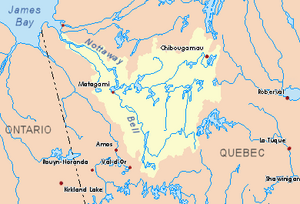Roy River facts for kids
Quick facts for kids Roy |
|
|---|---|

Watershed of Nottaway River
|
|
| Country | Canada |
| Province | Quebec |
| Region | Nord-du-Québec |
| Physical characteristics | |
| Main source | Roy Lake Eeyou Istchee James Bay (municipality), Nord-du-Québec, Quebec 449 m (1,473 ft) 49°07′09″N 74°36′31″W / 49.11917°N 74.60861°W |
| River mouth | Caopatina Lake, Opawica River Eeyou Istchee James Bay (municipality), Nord-du-Québec, Quebec 365 m (1,198 ft) 49°25′44″N 74°45′51″W / 49.42889°N 74.76417°W |
| Length | 64.6 km (40.1 mi) |
| Basin features | |
| Tributaries |
|
The Roy River is a river in Quebec, Canada. It flows into Caopatina Lake, which is part of the larger Opawica River system. The river is located in the Nord-du-Québec region, specifically in the area known as Jamésie.
The land around the Roy River is mainly used for forestry, which means cutting down trees for wood. People also visit the area for fun activities like fishing or camping. A forest road, R1032, runs along the east side of the river, making it easier to access. The river usually freezes over from early November until mid-May. It's generally safe to travel on the ice from mid-November to mid-April.
Contents
About the Roy River's Journey
The Roy River is surrounded by many other lakes and rivers. To the north, you'll find Caopatina Lake and the Opawica River. To the east are lakes like Oriol and Verchères, and the Cawcot River. South of the Roy River are Lac Roy and the Gouin Reservoir. To the west, there are places like Evrey Creek and Surprise Lake (Roy River).
Where the River Starts
The Roy River begins at Roy Lake. This lake is about 7 kilometers (4.3 miles) long and sits at an elevation of 449 meters (1,473 feet) above sea level. It's located in the Chambalon Township, within the Eeyou Istchee James Bay municipality. This starting point is about 34.4 kilometers (21.4 miles) southeast of where the Roy River ends. It's also about 95.3 kilometers (59.2 miles) south of the city of Chibougamau.
The River's Path
From Roy Lake, the Roy River flows for about 64.6 kilometers (40.1 miles). Its journey can be split into two main parts:
Upper Part of the River
The first part of the Roy River's journey covers about 32 kilometers (20 miles).
- It flows north, then west, through the Chambalon Township.
- The river continues north until it reaches the Pambrun Township.
- It then flows through Pambrun Lake, which is about 4 kilometers (2.5 miles) long.
Lower Part of the River
The second part of the river's journey is about 32.6 kilometers (20.3 miles) long.
- The river flows north, passing through the western part of Chrysologue Lake.
- It then crosses the border between Pambrun and Hazeur townships, flowing through the western part of Lake Verviers.
- The river turns west, then north, going around a piece of land and flowing through the northern part of Surprise Lake (Roy River). This lake is quite long, about 15.4 kilometers (9.6 miles).
- Finally, the river flows northeast, widening into a couple of unnamed lakes before reaching its end.
Where the River Ends
The Roy River flows into the southern shore of Caopatina Lake. From there, the water joins the Opawica River. The Opawica River generally flows west, passing through several lakes like Doda Lake. Eventually, the Opawica River meets the Chibougamau River to form the Waswanipi River.
The Waswanipi River then flows west through Lake Waswanipi, Goéland Lake, and Olga Lake. It finally empties into Matagami Lake. From Matagami Lake, the water flows into the Nottaway River, which eventually reaches Rupert Bay in James Bay. This means the Roy River's water eventually makes its way to the very large James Bay!
The spot where the Roy River meets the Opawica River is about 5.8 kilometers (3.6 miles) south of Caopatina Lake. It's also about 61 kilometers (38 miles) south of downtown Chibougamau.
River's Name and History
The name "Roy" is a French family name. For a long time, different Indigenous groups lived in this area, including the Attikamekw, the Algonquin, and the Cree peoples. The name "Rivière Roy" was officially recognized on December 5, 1968, by the Commission de toponymie du Québec, which is the organization in Quebec responsible for naming places.
 | Laphonza Butler |
 | Daisy Bates |
 | Elizabeth Piper Ensley |

